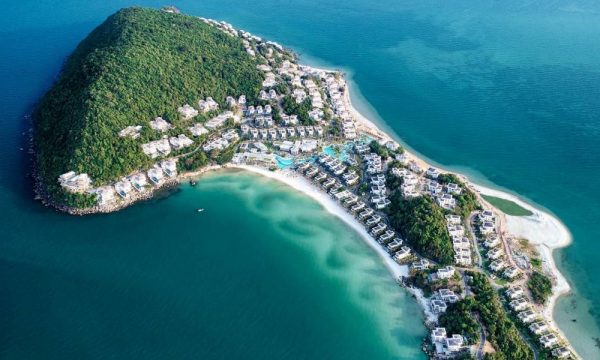PHU QUOC, Vietnam, 13 February 2019: When guidebooks and bloggers tell us now is the best time to visit an island destination before it loses its natural beauty and charm it’s a strong hint that big business and brands have already staked their claims at beachside properties and the blight of “overtourism” is just around the corner.
Vietnam’s favourite island holiday spot is heading in that direction mainly due to the arrival of major foreign branded resorts that displace smaller local resorts that were more in tune with communities and the environment.
You have only to look at the Phu Quoc Tourism Map, courtesy of Google, to see the extent of the invasion and recognise the island is now a tourism hot spot.

Developers will say “not bad going” for an island that opened its airport just seven years ago. Today most of the island’s 20 beaches that dot the island’s 150 km coastline are sprouting internationally branded hotels all keen on making a fast buck, while Phu Quoc enjoys its day in the sun.
The lead island in a compact archipelago of 28 islands, Phu Quoc fits comfortably in a competitive set of island destinations such as Bali in Indonesia and Samui in Thailand.
Located at the southern tip of Vietnam on the Gulf of Thailand, there are some convincing reasons to head for Phu Quoc for a holiday break if you live in Asia.
The island’s entertainment scene might be quieter than Boracay in the Philippines, or Thailand’s Phuket, but it has strong appeal for families and couples looking for a more laid-back, chill-out destination.
You can stay on the island for 30 days without a visa as long as you don’t venture to mainland Vietnam.
For gamblers the island opened a casino last December, the first in Vietnam that allows the country’s citizens to gamble, although there are financial rules to limit their wagers.
Last year, the island opened what it proudly calls the world longest aerial cable car an attraction that appeals to families and groups from China, who are looking for sightseeing options other than reading a book under the shade of a beach umbrella.
Apart from sunning on the beaches and enjoying the luxury of internationally branded hotels, there are opportunities to explore smaller islands in the archipelago by ferry and with 50% of Phu Quoc hilly terrain covered in national parks there are numerous walking trails to explore.
At the far north of the island the 603 metre-high Mount Chua dominates the landscape, the start of a series of hilly ridges that decline in height as you head for the island’s southern tip.
Driving the travel boom are regional low-cost airlines that offer direct flights including low-cost Vietjet, due to start a four-weekly service from Hong Kong 19 April.
There are international flights from Kuala Lumpur, Singapore, Bangkok, Seoul, Korea, Guangzhou in China, Siem Reap in Cambodia and seasonal charter flights from Russia. Add to that cruise ships that stop for a day’s sightseeing on week-long cruises between Singapore and Hong Kong and the daily footfall of tourists at the popular beaches is steadily rising possibly reaching a critical level much earlier than previously anticipated.
Even the government’s estimates that suggested the island would host 3 million visitors by 2030 appear to be a mite conservative these days. 2018 closed with around 2.5 million visits, up 25% on 2017.
Popularity is in part driven by positive endorsements by the likes of CNN that last September, named the island among the top five up-and-coming Asia Pacific destinations to visit.
According to CNN, for those planning their first trip to the Asia-Pacific region, major destinations that top the list, were Shanghai and Hong Kong (China), Tokyo (Japan) and Singapore, plus of course Phu Quoc.
“If you’re dreaming of a beach getaway in Asia, Phu Quoc in Vietnam should be a top contender,” CNN said.
But there are other voices that caution travellers. The highly respected Phu Quoc Island Guide recommends on its Facebook page that visitors should “not believe the marketing engine coming out of Phu Quoc from properties that are trying to sell you a false narrative.”
The online guide calls on visitors to the island to make a difference starting with avoiding all printed maps and guidebooks while on Phu Quoc Island.
“There is no recycling facility on the island,” the Facebook post stated. “All trash is burned, and guidebooks and maps are linked to child sex trafficking and sexpats.”
Travellers are told to support independent hotels owned and managed by locals to ensure revenue from tourism stays on the island, while the Facebook posts warn visitors not to be taken in by the “sustainability” story told be big branded hotels.
“Based on our historical experience any business operating on Phu Quoc Island that pushes the sustainability narrative should be avoided. (It’s) fake news,” the island’s top guide concluded.
(Source: Facebook posts Phu Quoc Island Guide)






